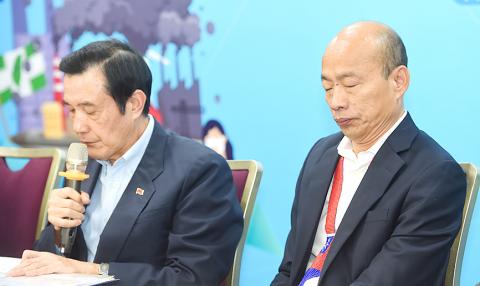Kaohsiung Mayor Han Kuo-yu (韓國瑜) yesterday said that if elected president, he would review President Tsai Ing-wen’s (蔡英文) policy to phase out the use of nuclear power by 2025, to ensure that people are free from fears of pollution and power shortages.
“If elected president, I would immediately review the erroneous policy of a ‘nuclear-free homeland by 2025’ and, based on a referendum on keeping nuclear power passed last year, propose a more reasonable and pragmatic goal and approach for the nation’s energy plan,” the Chinese Nationalist Party’s (KMT) presidential candidate told a news conference in Taipei.
He added that he “would make the fears over power shortages and having to wear a mask — which people have experienced over the past three-and-a-half years — completely disappear.”

Photo: Liu Hsin-de, Taipei Times
While most people might not understand energy policies due to their complexity, all they need is affordable electricity prices, clean air and reliable power, Han said.
To achieve those goals, Han said that he would reduce the use of coal-fired power, use more nuclear power and less renewable energy sources.
Renewable energy is more expensive and less stable, he said, adding: “We can gradually increase the use of renewable energy after the technologies mature and prices drop.”
While Tsai has denied that her policy would lead to power shortages and increased electricity prices, “that is a complete lie and utterly impossible as far as we know,” Han said.
“It is very regrettable that President Tsai would completely ignore people’s real needs at the expense of her political interests,” he said.
Asked if he would resume construction of the mothballed Fourth Nuclear Power Plant in New Taipei City’s Gongliao District (貢寮), Han said that he would to ensure its safety, of which the public would approve.
Asked about his plan to handle radioactive waste, Han said that his government would deal with it cautiously, adding that the technologies to process radioactive waste have improved significantly over the past few years.
“Taiwan is not the first nation to use nuclear power, nor does it have the most nuclear power plants,” Han said.
There are about 500 nuclear power plants worldwide, including several that are close to Taiwan, but outside the nation in Japan and China, he said, adding: “People just do not pay attention to them.”
Former president Ma Ying-jeou (馬英九) said that “we support developing renewable energy, but we are against reckless policies.”
The Tsai administration’s plan to phase out nuclear power by 2025 is not only impossible, but would drastically increase the nation’s energy costs, causing great burdens for the public, he said.
On Nov. 24 last year, Referendum No. 16, which sought to scrap the Tsai administration’s goal of abolishing nuclear power by 2025, was passed with 5,895,560 votes for and 4,014,215 against.
The proposal, initiated by Nuclear Myth Busters founder Huang Shih-hsiu (黃士修), asked: “Do you agree that subparagraph 1, Article 95 of the Electricity Act (電業法), which reads: ‘Nuclear-energy-based power-generating facilities shall wholly stop running by 2025,’ should be abolished?”

CHANGING LANDSCAPE: Many of the part-time programs for educators were no longer needed, as many teachers obtain a graduate degree before joining the workforce, experts said Taiwanese universities this year canceled 86 programs, Ministry of Education data showed, with educators attributing the closures to the nation’s low birthrate as well as shifting trends. Fifty-three of the shuttered programs were part-time postgraduate degree programs, about 62 percent of the total, the most in the past five years, the data showed. National Taiwan Normal University (NTNU) discontinued the most part-time master’s programs, at 16: chemistry, life science, earth science, physics, fine arts, music, special education, health promotion and health education, educational psychology and counseling, education, design, Chinese as a second language, library and information sciences, mechatronics engineering, history, physical education

DEADLOCK: As the commission is unable to forum a quorum to review license renewal applications, the channel operators are not at fault and can air past their license date The National Communications Commission (NCC) yesterday said that the Public Television Service (PTS) and 36 other television and radio broadcasters could continue airing, despite the commission’s inability to meet a quorum to review their license renewal applications. The licenses of PTS and the other channels are set to expire between this month and June. The National Communications Commission Organization Act (國家通訊傳播委員會組織法) stipulates that the commission must meet the mandated quorum of four to hold a valid meeting. The seven-member commission currently has only three commissioners. “We have informed the channel operators of the progress we have made in reviewing their license renewal applications, and

The High Prosecutors’ Office yesterday withdrew an appeal against the acquittal of a former bank manager 22 years after his death, marking Taiwan’s first instance of prosecutors rendering posthumous justice to a wrongfully convicted defendant. Chu Ching-en (諸慶恩) — formerly a manager at the Taipei branch of BNP Paribas — was in 1999 accused by Weng Mao-chung (翁茂鍾), then-president of Chia Her Industrial Co, of forging a request for a fixed deposit of US$10 million by I-Hwa Industrial Co, a subsidiary of Chia Her, which was used as collateral. Chu was ruled not guilty in the first trial, but was found guilty

Taiwan People’s Party (TPP) Chairman Huang Kuo-chang (黃國昌) yesterday appealed to the authorities to release former Taipei mayor Ko Wen-je (柯文哲) from pretrial detention amid conflicting reports about his health. The TPP at a news conference on Thursday said that Ko should be released to a hospital for treatment, adding that he has blood in his urine and had spells of pain and nausea followed by vomiting over the past three months. Hsieh Yen-yau (謝炎堯), a retired professor of internal medicine and Ko’s former teacher, said that Ko’s symptoms aligned with gallstones, kidney inflammation and potentially dangerous heart conditions. Ko, charged with